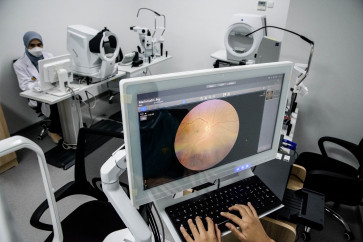Explainer:What do we know about the health of Japan's Shinzo Abe?
Change Size
 Japanese Prime Minister Shinzo Abe takes off his mask at the start of a news conference at the prime minister's official residence in Tokyo, Japan, on Friday. (Pool/Reuters/Franck Robichon)
Japanese Prime Minister Shinzo Abe takes off his mask at the start of a news conference at the prime minister's official residence in Tokyo, Japan, on Friday. (Pool/Reuters/Franck Robichon)
P
rime Minister Shinzo Abe, Japan's longest-serving premier, said on Friday he was resigning because of poor health, ending a stint at the helm of the world's third-biggest economy during which he sought to revive growth and bolster its defenses.
Abe has battled the disease ulcerative colitis for years and two recent hospital visits within a week had fanned questions on whether he could stay in the job until the end of his term as ruling party leader, and hence, premier, in September 2021.
He has spoken of struggling with the disease since junior high school. A flare-up in 2007 forced him to quit as prime minister.
Here are details of the disease:
What is it?
Ulcerative colitis is an inflammatory bowel disease that can cause ulcers in the lining of the colon and rectum. Symptoms include diarrhea, abdominal cramping, weight loss and fatigue.
The cause is unknown, but both heredity and immune system malfunctions, in which the immune system attacks cells in the digestive tract, are believed to play a role. Diet and stress can aggravate the condition.
Complications may include an increased risk of colon cancer, clots in blood vessels, and a perforated colon.
What is the treatment?
Ulcerative colitis is incurable. While moderate to severe cases are treated with corticosteroids, this is not a long-term treatment as side effects can include bone loss, high blood pressure and weight gain.
A type of medication called 5-aminosalicylic acid (5-ASA) is the standard treatment, including Asacol, which Abe has said he started taking in 2009, when it was approved in Japan. It had been available overseas before that.
"If this drug Asacol had taken more time to appear on the market in Japan, it's quite possible that I would not be where I am today," Abe said in a 2013 speech.
"For that very reason, I consider it both my role and my fate to restore and enrich the lives of patients suffering from intractable illnesses."
Side effects from the medicine, also known as mesalamine, can include nausea, headaches or vomiting. Rarely, it can worsen ulcerative colitis symptoms.
Other treatments include immunosuppressant drugs that require careful supervision and are usually only used if patients do not respond to other treatments.
The most drastic treatment is surgical removal of the colon.
How does it affect quality of life?
If kept under control, ulcerative colitis has minimal impact on daily activities between flare-ups, which can be caused by stress.
Some patients have frequent colonoscopies, such as every six months, to check for cancer. Abe undergoes a comprehensive physical exam twice a year.
In 2017, Abe said his treatment was fuelling his appetite, adding, "I now must worry about issues I once thought were completely unrelated to me, including gaining visceral fat, worrying about body fat, and my cholesterol level. I hit the upper limits on tests for each of these issues."









